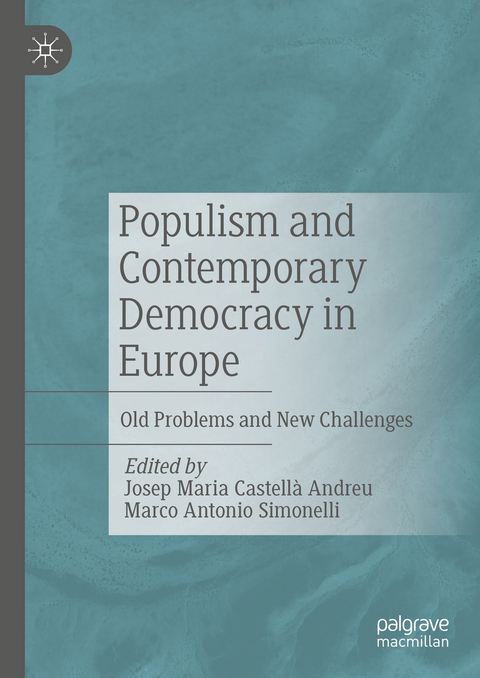
Populism and Contemporary Democracy in Europe
Springer International Publishing (Verlag)
978-3-030-92883-4 (ISBN)
lt;p>Josep Maria Castellà Andreu is Full Professor of Constitutional Law, University of Barcelona, Spain.
Marco Antonio Simonelli is Postdoctoral Research Fellow on Constitutional Law, University of Barcelona, Spain.
Part 1: The Populist Ideology and Constitutional Democracy.- Chapter 1: From Populist Parties to Populist Politics. Populism as a unifying ideology.- Chapter 2: Populisms, Constitutions, Constitutional Courts and Constitutional Democracy.- Chapter 3: The Sirens' Song. When Right-Wing Populism Deals with "Democracy". The Case of the Rassemblement National in France.- Part 2: Populism in Practice. Its Impact on the Rule of Law.- Chapter 4: Populism and constitutional courts: a perspective from the Venice Commission.- Chapter 5: Constitutional effects of populism in EU Member States, 2010-2020.- Chapter 6: On the Experiences of a Constitutional Court in an Illiberal Democracy. Incapacitated but Necessary.- Chapter 7: Constitutional Erosion in Spain: From the Catalan Pro-Independence Crisis to the (Intended) Judiciary Reforms.- Part 3: Populism and the European Union.- Chapter 8: The EU Unease about Populism.- Chapter 9: The Authoritarian Conjuncture in Europe and Liberals' Crocodile Tears.-Chapter 10: The 'EU populist crisis': The effect of populism on the EU legal order and vice versa: Populism, EU responses and EU constitutional identity.- Chapter 10: Judicializing the Rule of law Through the Preliminary Ruling.- Part 4: Populism, the Pandemic and the Future of Democracy.- Chapter 11: Preserving Democracy and the Rule of Law in a Pandemic. Some Lessons from the Venice Commission.- Chapter 12: The duration of the state of alarm in Spain and the problems posed for democracy.- Chapter 13: "To Watch and Control the Government". 'Rediscovering' Parliaments' Oversight Function.- Chapter 14: Pandemic, Populism, and Polarisation.- Chapter 15: Might Covid Help Strengthening European Democracies?.
"A book that provides a broad overview regarding the relationship between populism and contemporary constitutional democracies. ... This idea seems to be a perspective incompatible with the logic governing the democratic rule of law, and it is precisely this incompatibility between 'We are the people' populism, constitutional democracy, and the pluralistic view allowed by different constitutional actors - such as of courts, parliaments, and political parties - that finds a deep reflection in the book." (Enrico Andreoli, Revista General de Derecho Público Comparado, Vol. 31,2022)
“A book that provides a broad overview regarding the relationship between populism and contemporary constitutional democracies. … This idea seems to be a perspective incompatible with the logic governing the democratic rule of law, and it is precisely this incompatibility between ‘We are the people’ populism, constitutional democracy, and the pluralistic view allowed by different constitutional actors - such as of courts, parliaments, and political parties - that finds a deep reflection in the book.” (Enrico Andreoli, Revista General de Derecho Público Comparado, Vol. 31,2022)
| Erscheinungsdatum | 14.04.2022 |
|---|---|
| Zusatzinfo | XIX, 338 p. |
| Verlagsort | Cham |
| Sprache | englisch |
| Maße | 148 x 210 mm |
| Gewicht | 596 g |
| Themenwelt | Recht / Steuern ► Öffentliches Recht |
| Sozialwissenschaften ► Politik / Verwaltung ► Politische Systeme | |
| Schlagworte | Covid-19 • Democracy • Democratic Backsliding • EU • Populism • Rule of Law • Venice Commission |
| ISBN-10 | 3-030-92883-7 / 3030928837 |
| ISBN-13 | 978-3-030-92883-4 / 9783030928834 |
| Zustand | Neuware |
| Haben Sie eine Frage zum Produkt? |
aus dem Bereich


